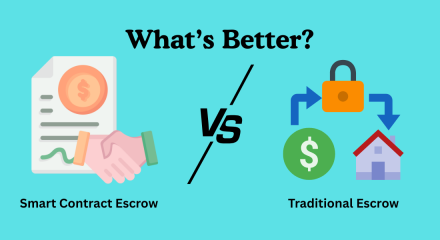
Crypto Escrow in Real Estate & High-Value Asset Transfers
In today’s fast-paced digital world, blockchain technology is proving itself to be a key player in revolutionizing industries. One of the most promising applications of blockchain is in the field of real estate and high-value asset transfers, especially when it comes to crypto escrow services. By facilitating secure, transparent, and efficient transactions, crypto escrow is paving the way for more reliable and trustworthy deals in these sectors.
In this article, we’ll explore the concept of crypto escrow, how it works, its advantages in real estate and high-value asset transfers, and why it’s becoming a vital tool for modern-day transactions.
What is Crypto Escrow?
Crypto escrow is a service that acts as a third-party intermediary, holding funds in a secure account until the terms of an agreement are fully met. The primary role of escrow services is to ensure that both parties involved in a transaction uphold their part of the deal. This concept, traditionally used in real estate and online transactions, is now being integrated into the world of cryptocurrencies and high-value assets.
In a typical crypto escrow scenario, a buyer sends cryptocurrency (such as Bitcoin, Ethereum, or other altcoins) to the escrow account, where it is held securely until the seller delivers the agreed-upon assets or services. Once the conditions are met, the crypto is released to the seller, ensuring that the buyer's payment is protected until the terms of the deal are fulfilled.
How Does Crypto Escrow Work?
Crypto escrow operates similarly to traditional escrow services, but with the added benefit of blockchain technology for enhanced security and transparency. Here’s how it works:
-
Agreement: Both parties—buyer and seller—agree on the terms of the transaction, which includes the value of the property or asset, delivery conditions, and timelines.
-
Escrow Account Setup: The buyer deposits cryptocurrency into the escrow wallet, where it is held securely by the escrow provider. This provider may be a trusted third-party platform or a smart contract on the blockchain.
-
Verification: Once the funds are deposited, the escrow provider verifies that both parties have met the initial requirements of the agreement. This may involve verifying the identity of the parties, ensuring the authenticity of the asset, or confirming that the real estate transaction is legitimate.
-
Delivery of Goods or Services: After the conditions are met, the seller delivers the agreed-upon asset, property, or service to the buyer.
-
Release of Funds: Once the buyer confirms receipt and satisfaction with the delivery, the crypto funds are released to the seller. If there’s a dispute, the escrow provider may mediate or refund the buyer’s funds.
Key Benefits of Crypto Escrow in Real Estate & High-Value Asset Transfers
-
Security and Transparency: Traditional escrow services often involve banks or third-party intermediaries that can be vulnerable to fraud or human error. With crypto escrow, blockchain technology ensures that all transactions are recorded transparently and securely, providing both parties with a clear view of the transaction’s progress.
-
Speed of Transactions: Traditional property transactions can take days or weeks due to banking delays, legal processes, and other paperwork. Crypto escrow significantly reduces these timeframes by enabling faster transfers, especially for cross-border deals.
-
Reduced Transaction Costs: Crypto escrow eliminates the need for intermediaries such as banks and lawyers, which often incur hefty fees. By utilizing decentralized platforms and cryptocurrency, buyers and sellers can save on these costs and streamline the entire process.
-
Global Reach: Real estate deals, particularly in luxury properties or high-value assets, are often conducted internationally. Crypto escrow opens up opportunities for global transactions, bypassing the limitations and delays imposed by traditional financial systems.
-
Dispute Resolution and Risk Mitigation: Disputes are common in high-value asset transfers, especially when both parties disagree about contract terms or delivery. Crypto escrow platforms typically offer built-in mechanisms for resolving conflicts, ensuring that the buyer’s funds are only released when they are fully satisfied with the deal.
-
Protection from Fraud: Fraudulent schemes are unfortunately prevalent in both the real estate market and high-value asset exchanges. Crypto escrow offers an additional layer of protection by ensuring that funds are not released to the seller until they’ve delivered the goods or services as agreed upon. This significantly reduces the risk of scams and fraudulent activity.
Use Cases of Crypto Escrow in Real Estate
-
Luxury Properties: High-value properties often require a lot of paperwork, legal compliance, and negotiations. Crypto escrow simplifies the process, ensuring that both the buyer and seller are protected at each stage of the transaction. With cryptocurrencies, these transactions can be conducted across borders, removing the barriers created by traditional banking systems.
-
Cross-Border Transactions: Real estate deals involving international buyers can be slow and expensive, due to currency conversions, cross-border fees, and delays in money transfers. Crypto escrow allows for seamless global transactions without the need for currency exchange, giving buyers and sellers the confidence to proceed with international investments.
-
Real Estate Investment and Tokenization: With the advent of real estate tokenization, crypto escrow plays a crucial role in managing tokenized real estate deals. Blockchain-based tokens represent ownership in properties, and crypto escrow ensures that the transaction is secure and transparent, whether for fractional ownership or complete property sales.
Benefits in High-Value Asset Transfers
-
Art and Antiques: High-value assets such as art, collectibles, and antiques can be easily traded through crypto escrow. Buyers and sellers can negotiate terms and set conditions for the delivery of the asset, all while utilizing cryptocurrency for payment. Crypto escrow provides security, ensuring that the buyer only receives the asset after the agreed-upon conditions are met.
-
Luxury Goods and Jewelry: High-value luxury goods, including diamonds, watches, and other jewelry, often require secure transactions. Crypto escrow provides a way for buyers and sellers to ensure the transaction is legitimate and that payment is only released once the asset has been confirmed and delivered.
-
Private Equity and Business Transactions: In private equity deals or business acquisitions, crypto escrow ensures that the funds are secure until all terms of the agreement are met. This helps to prevent fraudulent business deals and protects both the investor and the business being acquired.
Future of Crypto Escrow in Real Estate & High-Value Asset Transfers
The future of crypto escrow in real estate and high-value asset transfers looks bright. As cryptocurrency adoption increases, more buyers and sellers will turn to decentralized solutions for secure, fast, and low-cost transactions. The ability to facilitate cross-border real estate deals and asset transfers using cryptocurrency will open up new opportunities for both seasoned investors and newcomers.
Additionally, as blockchain technology continues to evolve, crypto escrow services will become even more streamlined, offering more sophisticated features such as automated smart contract executions, multi-signature wallets, and enhanced dispute resolution methods.
Conclusion
Crypto escrow is changing the landscape of real estate and high-value asset transfers by offering a secure, fast, and cost-effective alternative to traditional escrow services. With its ability to handle cross-border transactions, mitigate risks, and reduce costs, crypto escrow is rapidly becoming the preferred method for large transactions. As the crypto market continues to evolve, we can expect further advancements in escrow services, making the process even more efficient and user-friendly for all parties involved.





